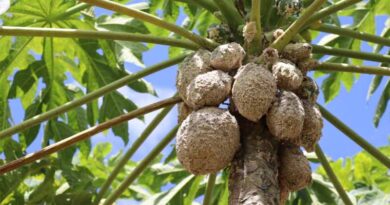Harnessing The Power Of Biostimulants: A Key To Climate-Smart Agriculture
19 January 2024, UK: In an era where climate change poses an unprecedented threat to global food security, the agricultural sector is undergoing a profound transformation. Farmers, policymakers, and industry leaders are increasingly turning to climate-smart agriculture as a beacon of hope. This innovative approach not only addresses the challenges posed by a changing climate but also seeks to create a sustainable and resilient future for agriculture.
Climate-smart agriculture represents a comprehensive strategy that integrates three key pillars—increasing productivity, enhancing resilience to climate change, and reducing greenhouse gas emissions. This multifaceted approach aims to create a more sustainable and efficient agricultural system that can adapt to the challenges posed by a warming planet. One crucial ally in this endeavor is biostimulants – a group of substances that stimulate plant growth, boost nutrient uptake, and enhance overall plant health.
Biostimulants represent a promising tool in the pursuit of climate-smart agriculture.
When applied to plants or soil, Acadian’s Ascophyllum nodosum seaweed extracts stimulate natural processes, improving nutrient efficiency, stress tolerance, and overall plant performance. Given that nitrous oxide (N2O) stands out as one of the most potent greenhouse gases globally, boasting a global warming potential approximately 300 times greater than that of CO2, agriculture emerges as a major contributor to this gas¹. In fact, roughly 80%2 of total agricultural emissions originate from N2O alone.
Enhancing nutrient utilization in plants can thus play a pivotal role in mitigating greenhouse gas emissions. Acadian Plant Health™ has been studying the effect of their seaweed extract, Ascophyllum nodosum, on nutrient use and nutrient uptake when applied to crops. The results showed enhanced root growth with improved absorptive function of roots leading to an increase in uptake of dissolved nutrients. Macronutrient absorption in particular increased, but also important micronutrients the plant uses as well. “Additionally we’ve seen changes in gene expression that affect nutrient uptake and movement within the plant, so plants grow better and are more productive under limited nutrition,” says Dr. Holly Little, Research and Development Director with Acadian Plant Health. “When treated with Acadian’s Ascophyllum nodosum extract, plants exhibit increased nitrogen absorption, resulting in enhanced growth and productivity even with reduced fertilizer application.”
Concerning stress tolerance, climate change brings about more frequent and intense abiotic stresses such as drought, salinity, and extreme temperatures. Acadian’s biostimulants help plants cope with these challenges by strengthening their natural defense mechanisms and improving resilience to these adverse conditions. “We have been able to study the effect of our seaweed extract, Ascophyllum nodosum, on plants experiencing heat stress. With our unique extraction process, we are able to liberate numerous bioactive compounds such as mannitol, polysaccharides, and betaines. These compounds have shown to improve plant tolerance to stressful growing conditions, including, but not limited to, heat stress and drought,” says Dr. Holly Little.
“Indeed, Acadian’s biostimulants contribute to the adaptability of crops to changing climate conditions. This adaptability is crucial for farmers facing unpredictable weather patterns, allowing them to maintain consistent yields despite environmental challenges,” says Little.
As the world grapples with the challenges posed by climate change, integrating these biostimulants into farming practices can contribute to sustainable food production, environmental conservation, and the resilience of agricultural systems. As we look towards the future, harnessing the power of biostimulants may well be a key strategy in building a more climate-smart and sustainable agricultural landscape.
1IPCC (2007) Climate Change 2007: The Physical Science Basis. Contribution of Working Group I to the Fourth Assessment Report of the Intergovernmental Panel on Climate Change, eds Solomon S, et al. (Cambridge Univ Press, Cambridge, UK).
Also Read: Meghmani Organics Limited forays into crop nutrition segment with Nano Urea
(For Latest Agriculture News & Updates, follow Krishak Jagat on Google News)















